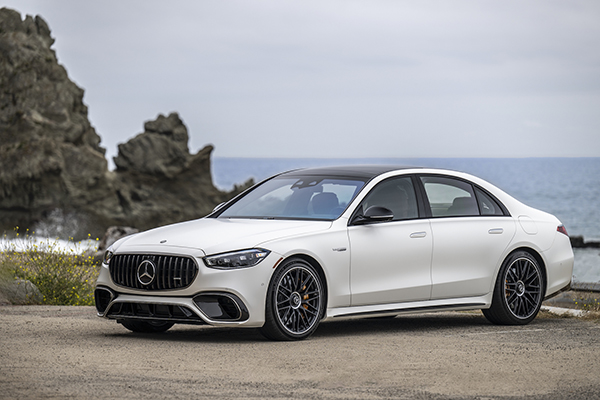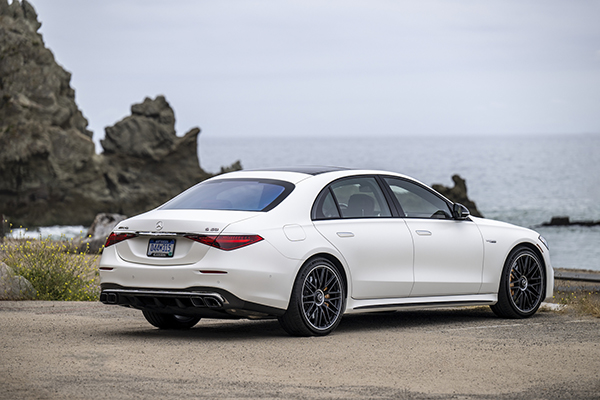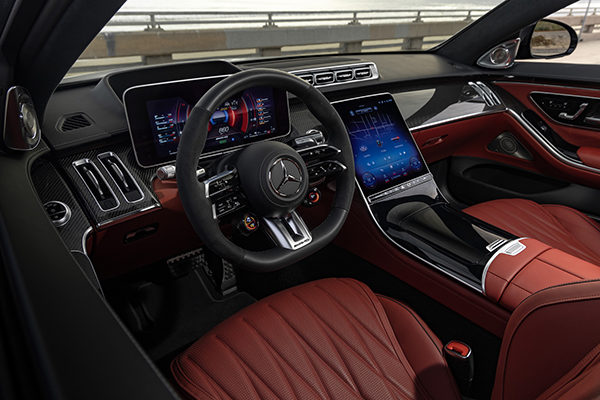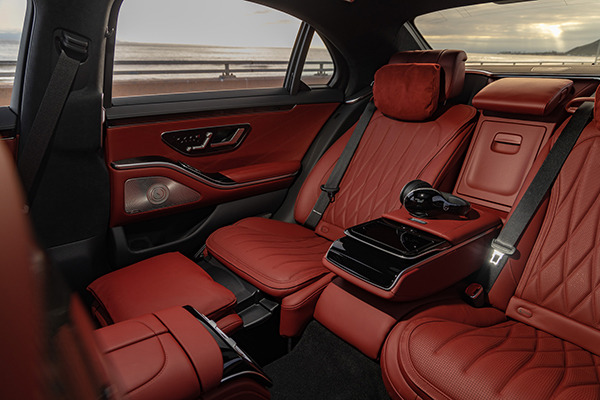Not five minutes into my drive of the 2024 Mercedes-AMG S 63 E Performance, the car has decided I need to relax. Maybe I’m tense about tapping into all 791 hp from this plug-in hybrid powertrain…or taking advantage of the performance suspension to slice through these roads in the Santa Monica Mountains…or deserving the trust afforded me to pilot a car with a sticker price that will certainly top $150,000.

The S 63 E Performance may be the most technologically advanced car that has ever hit the market. The S-Class has typically held that mantle, but turning the S 63 E into a plug-in hybrid by incorporating technology born in Formula 1 takes it to the next step. It doesn’t just use the hybrid system to chase efficiency. It also aims at performance while maintaining an air of civility. Essentially, the S 63’s new tech is meant to help a car that does almost everything well add a few more bullets to its holster.
Mercedes-Benz AMG S 63 E Performance: Hybrid power broker
The engine makes the same power as it did in the last S 63, which was last offered in 2020 as a sedan and 2021 as a coupe. It’s a twin-turbo 4.0-liter V-8 that huffs out 603 hp and 664 lb-ft of torque. It’s paired with the same 9-speed automatic transmission with a wet clutch instead of a torque converter. By itself, this combo launched the 2020 S 63 from 0-60 mph in 3.5 seconds.
An AMG grille with vertical slats and a unique front bumper with larger inlets feed more air to the engine than in other S-Classes. The S 63 also has a round AMG logo on the hood instead of a standing star ornament, to go with its forged wheels, AMG side skirts, and a rear diffuser.
The engine is just part of the new powertrain. Like in the 2024 Mercedes-Benz C 63 S E Performance, an electric motor sits on the rear axle where it’s teamed with a 2-speed transmission and a limited-slip differential in a single drive unit. The electric motor can add 188 hp and 236 lb-ft of torque to bring the totals to 791 hp and 1,018 lb-ft. A 13.1-kwh lithium-ion battery is also mounted in the floor above the rear axle. Using technology from the Mercedes F1 program, it consists of 1,200 liquid-cooled cells that are stabilized at 113 degrees F so the battery can provide repeated shots of energy to the motor.
The powertrain doesn’t always make full power, but then again drivers rarely use full power. The full 188 hp from the motor is always available for up to 10 seconds at a time whenever the driver pins the throttle, but the motor lends a peak 38 hp in Comfort mode and 94 hp in Sport mode.
The S 63 may have supercar power, but it doesn’t hit like a supercar. At its core, the big Benz is a very civilized luxury car after all. Comfort mode provides a smooth throttle pedal, though without the laziness from the throttle and transmission that characterizes other S-Class models. Sport mode livens the reactions and Sport+ puts them on high alert. No matter the mode, when the engine is on, it rumbles reassuringly in the background, only howling when I mash the throttle.

Sport+ also enables a launch control function called Race Start. It’s easy to use: Simply come to a stop, apply the brake and throttle at the same time, then let off the brake.
I try it out at a stop sign on an abandoned stretch of canyon road. The V-8 lets out a series of staccato barks as it runs up against a rev limiter, and in this case the S 63 does launch like a supercar. Power comes on so hard that the rear end wiggles and the 0-60 mph run flashes by in a scant 3.2 seconds, according to both Mercedes and my butt dyno. The 9-speed automatic cracks through the gears and the car tops out at an electronically limited 155 mph.
At the other end of the spectrum, I try out the default EL, or Electric mode, which is accompanied by a synthetic spaceship-like whirr. The motor has power enough to get the car underway and up to freeway speeds without turning on the engine. It switches to Comfort’s hybrid mode when accelerating too hard, topping 87 mph, or pushing past a detent near the end of the throttle pedal travel.
Throughout my day in the S 63 E Performance, the battery charge pinballs up and down. EL saps the charge and Sport+ uses the brake regeneration and engine to charge it back up. An initial drive in EL mode drops the battery charge from full to 41%, but several miles in Sport+ push it back up to 71%. Later, EL mode drops it to 25%, at which point the powertrain switches on and the car changes to Comfort mode, but more miles in Sport+ bring it back up to the mid 40s by the end of the day.
In any driving mode, drivers can choose from four levels of brake regeneration, from 0 to 3. The car freewheels in the 0 setting, while 1 provides a feel like engine braking with an automatic transmission. Level 2 has stronger regen, and 3 provides what Mercedes calls one-pedal driving.
For most of my drive, I don’t even notice what regen setting I’m in because this feels like a gas-powered car. Later, I discover that the regen settings are chosen through the drive mode dial on the right side of the steering wheel. I try them out and find that Level 3 allows mostly one-pedal driving, but I’m not confident about coming to a full stop and find myself using the brake pedal. It doesn’t matter because one-pedal driving feels wrong with the V-8 purr in the background, so I switch back to Level 1.

I never make a full range run in EL mode, but expect the EPA figure to come in at about 15 miles of electric range. Mercedes says the S 63 E Performance can charge from 25-100% in 3.25 hours on a Level 2 outlet or 7 hours on a Level 1 outlet through its 3.7-kw onboard charger.
Mercedes-Benz AMG S 63 E Performance: Wrangles its mass
The plug-in hybrid powertrain adds 450 pounds or more to an already heavy car, bringing the total to at least 5,700 pounds (that’s the European spec, and U.S. cars should weigh more thanks to additional equipment). However, Mercedes-AMG throws everything it can at the S 63 to control its mass and make it sportier. Like other S-Class models, it comes with a three-chamber air suspension and adjustable dampers. It also gets active anti-roll bars controlled by a 48-volt system, active engine mounts, and rear-wheel steering.
Company engineers also strengthened the body structure. Up front, they added an aluminum stabilizer bar under the engine and a suspension cross brace up top to improve torsional stiffness. Out back, they added aluminum struts in a diagonal layout across the underbody. The struts team with the battery and its fiber-reinforced plastic compartment to also increase body rigidity. When in their stiffer mode, the active engine mounts have the same effect.
Despite its weight, the S 63 E Performance is more controlled than other S-Classes. At 210.1 inches long, the S 63 carves out a large presence on the road, but it drives smaller than that. Rear-wheel steering helps it cut sharp corners tighter and maneuver more easily in parking lots. The active anti-roll bars and firmer settings for the air springs and dampers limit body lean, while active bolsters help keep front seat occupants in place in turns. Quick, direct, light steering makes it all feel very manageable. It’s no sport sedan and it’s not as sporty as the 2023 BMW 7-Series, but the S 63 E Performance gains some welcome body control that lesser S-Classes lack.
The handling can be aided by the drive modes. The dampers and air suspension react through three levels of firmness in Comfort, Sport, and Sport+ modes, with sharper reactions the higher you go up the scale. Thankfully, none of the modes disrupts the S-Class’s famously smooth ride quality, even on the available 255/30R21 front and 285/35R21 Michelin Pilot Sport 4S tires (20-inch wheels with similarly staggered tires come standard). The baseline is certainly firmer than other S-Class models, but it’s quite comfortable and road imperfections only have the chance to disrupt comfort in Sport+.
Those so inclined can also choose from Basic, Advanced, and Pro stability control modes to tighten up or free up the electronic nannies. If you’re driving this big beast hard enough to need Pro mode, you’re either a professional stunt driver or insane.
Big brakes arrest the S 63’s momentum. Up front, 15.7-inch rotors are clamped down upon by 6-piston calipers. At the rear, single-piston calipers pinch 15.0-inch rotors. On these mountain roads the brakes prove strong with a natural pedal feel instead of the numb feel in Mercedes’ electric cars.

Mercedes-Benz AMG S 63 E Performance: Quiet comfort
In addition to its controlled character, piloting the plug-in hybrid S 63 is a pleasure due to its cabin, which blends mature comfort with sporty touches and cutting edge technology. The sporty bits include a smaller twin-spoke steering wheel with paddle shifters, AMG nappa upholstery and emblems on the seats, a Supersport theme for the 12.3-inch digital instrument cluster, Race and Supersport options for the head-up display, and access to the AMG Track Pace app that acts as telemetry and a driving coach on select tracks around the world.
The standard 12.8-inch portrait-style touchscreen also has several screens to show hybrid and performance displays, some of which combine. The efficiency-based screens are Energy Flow, which shows where the power is coming from as well as the state of the battery charge, and a Consumption screen with a graph of consumption in 30- and 90-minute intervals, as well as a three-hour interval.
Performance can be monitored through a Drive screen that shows engine and motor rpm and torque in real time, a Vehicle screen that shows the action of the dampers and the angle of steering front and rear, and an Engine screen with real-time hp and torque figures, as well as a pair of additional gauges.
I find it fun and informative to watch the Drive, Vehicle, and Engine screens to see where the power is coming from, how much power is being used, and what the rear wheels are doing at various speeds. The rear wheels can turn up to 2.5 degrees opposite of the fronts, but that’s only at parking lot speeds. On these twisty roads, they turn only about a half a degree opposite of the fronts at 40 mph and only a tenth or two-tenths of a degree up near the 62-mph inflection point at which they turn with the front wheels to improve stability.
Mercedes loads up the S 63 with luxury features as well, including a Burmester audio system with Dolby Atmos surround sound, wireless Apple CarPlay and Android Auto, 64-color ambient lighting, and multi-contour front seats with heating, cooling, and massage. The seats are part of that aforementioned relaxation program called Energizing Comfort, which also incorporates audio and lighting elements to help smooth me out.
Like it always has, the S 63’s tech extends to safety features. They include adaptive cruise control, active lane control, automatic emergency braking with a cross-path function, blind-spot monitors that steer away from potential collisions, automatic lane changes, traffic-sign recognition, and a driver-attention monitor.
It all adds up to a technological tour de force that uses its tech to improve handling, power, comfort, safety, and connectivity. It will also, undoubtedly, come at a stunning price. Expect at least a few thousand more than the $152,995 of the last S 63. For that money, you’ll get a car that can do just about everything well, even deciding when you need to relax.
2024 Mercedes-AMG S 63 E-Performance Civilizes Big Horsepower
11/07/2023
No Comments
Mercedes-Benz | Mercedes-AMG
Click to rate this post
[Total: 1 Average: 5]